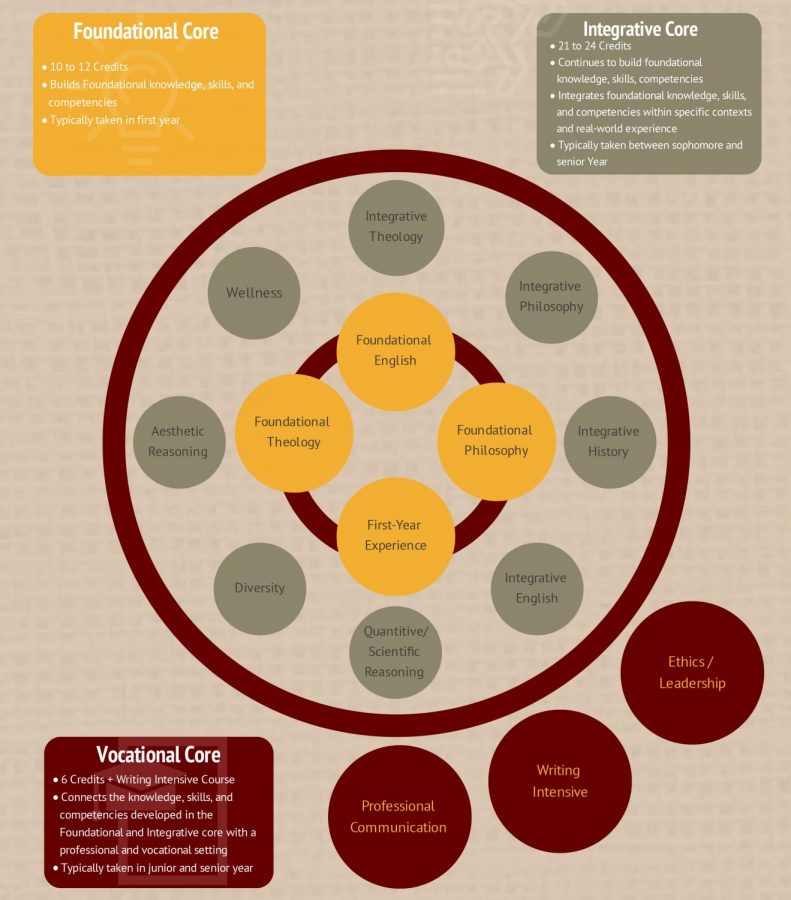Gannon revises liberal core curriculum to aid students
The new liberal core curriculum encompasses students’ four years at Gannon. The three categories of core classes, “Foundational Core,” “Integrative Core” and “Vocational Core,” are designed to better prepare students for entering the workforce.
October 20, 2020
A graduating student in the 21st century can be held to the highest standards, with future employers expecting proficiency in standard skills like communication and scientific reasoning, as well as newer skills like leadership, intercultural competence and service learning.
Gannon University’s liberal studies task force has noticed this and as a result, recently published a preliminary core curriculum proposal that revises the core to emphasize skills students need to succeed upon graduation.
Eric Dart, Ph.D., the director of the liberal studies task force, said, “We looked at the Gannon mission, we looked at our service standards, we looked at what other universities are doing, the student experiences and how we can help our students have the best and prosperous life in the 21st century.”
The new proposed model is based on the feedback given from a research survey emailed to students, faculty, alumni, employers and co-curricular partners. The survey responses ranked leadership, oral communication and writing skills as the top three competencies followed by teamwork and technological fluency. Findings also included that a majority of students agreed that the completion of the liberal studies core proved to be a challenge for graduation and needed revision.
The old core included foundational, developmental and integrative parts, whereas the new core includes foundational, integrative and vocational elements. The proposed curriculum integrates foundational knowledge with real-world experiences in classes like wellness and diversity, then connects those skills to the students’ specific professional setting.
Seamus Clerkin, a senior theater and communication arts major, said the proposed revisions are a positive change.
“I believe the changes that now focus on vocation are innovative and provide students with new creative outlets to gain the core knowledge they need to progress in their fields,” Clerkin said. “I commend Gannon for staying on top of the times and going through older curriculum in order to update it. It is important to continue to meet the needs of students. In a professional world that is beginning to look for more soft skills (innovative mindset, creative outlook, communication skills) rather than hard skills (more technology-based), I believe these liberal core revisions are very beneficial to the student body.”
Classes like leadership seminar which was previously a one-credit course, are now three credits, allowing for students to fully engage with the experience. Dart said the task force has intentionally not become overly prescriptive with the categories as they await feedback about the model. It is, however, meant to bridge the gap between lived experiences and personal life.
Natalee Stinebiser, a sophomore international management major, said moving forward, the curriculum will be a great improvement throughout the university’s many departments.
“I think that this will be way more beneficial than the way it was before,” Stinebiser said. “Looking at this in terms of my business degree, I think I would have found these liberal arts courses helpful if it was more vocational rather than it being so generalized. It is great that we’re adding a wellness and diversity course. That is especially important because our world is so diverse, and it is beneficial for students of all majors to understand it.”
In the new model, the foundational core focuses on theology, philosophy, English and first-year experience, totaling 10-12 credits that should be taken in a student’s first year of study. The integrative core would allow for more freedom in the choice of classes, totaling 21-24 credits to be taken in the student’s sophomore, junior and senior years. Lastly, the vocational core consists of six credits, including a writing-intensive course, a professional ethics course and a leadership course. These classes would ideally be taken in the student’s senior year.
Dart emphasized that the new wellness and diversity classes aren’t meant to box in terms, but to allow for diversity to enter the classroom in various ways. He explained that this requirement might be filled using global diversity, women’s studies, racial justice and other classes. There is no clarification yet as Dart said they don’t want to be so overbearing that it becomes counterproductive.
Megan Woller, Ph.D., the director of liberal studies and an assistant professor of Fine Arts, said the curriculum is always changing to correlate with the challenges students face.
“I think in higher education you always have to adapt,” Woller said. “In this point in the 21st century you have technological changes and a society with justice issues like racial injustices,” mentioning that these courses bring those issues to the forefront and allow students to discuss them in a respectful environment.
The new wellness course also comes as students replied to the survey saying skills like managing health and building a budget would be helpful upon graduation.
Julia Danko, a junior physician assistant major, said, “The liberal core revisions seem geared toward making students remember their past knowledge and apply it to their current studies. Not to say that classes at Gannon don’t do that currently, but it seems that the emphasis on gaining knowledge, acquiring skills, then the demonstration that the student is competent in these areas is much stronger in the liberal core revisions.”
Being a student who has gone on multiple alternative break service trips and traveled across the world through Gannon’s traveling programs, Danko cares deeply about the new wellness and diversity courses.
“I love the addition of the wellness and diversity courses because these are topics that are usually touched on outside the classroom or for short periods of time inside the classroom,” Danko said. “Many students at Gannon do not actually receive education in these two areas, which I believe is foundational for forming a socially responsible global citizen.”
With student concerns about the core being a challenge separate from their majors, Woller said she hopes it will help future students be able to make stronger connections between the skills and competencies with their vocations.
The core will be introduced to different groups across campus over the following weeks and the task force hopes to implement it for the incoming freshmen in the fall 2022 semester.
CHLOE FORBES






